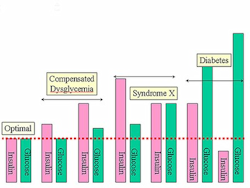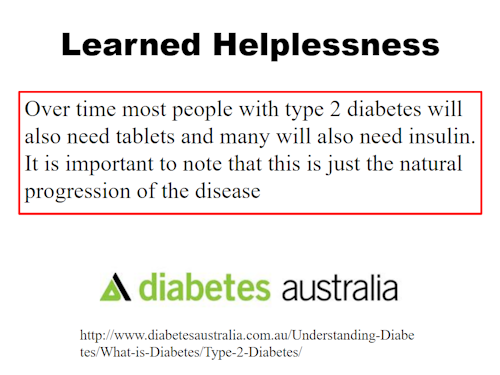Turning Insulin On and Off.
You have some dietary control over insulin. When you wake up in the morning, having not eaten for eight hours, you'll be quietly burning fat, and insulin will be "off."
When you eat breakfast, if you avoid toast, porridge, Weetbix, bagels, cereals, all sugars and carbohydrates, you can keep burning fat until your next meal.
![]() Breakfast; Bacon and eggs, with some vegetable, kale, tomato, silver beet, cabbage, spinach or egg plant is an easy option.
Breakfast; Bacon and eggs, with some vegetable, kale, tomato, silver beet, cabbage, spinach or egg plant is an easy option.
Nina Teicholz tells us that in 1961, cooked breakfast, often bacon and eggs was common in America. By 2010, almost everyone was eating cereal or oatmeal, with low-fat milk and low-fat yoghurt, for breakfast.
In 1961, one person in seven was obese, and 1% of Americans had type 2 diabetes. By 2010, one person in three was obese and 11% were type 2 diabetic.
Lunchtime?
Can you keep burning fat? No sandwiches, no pizza, cakes or muffins.
I've found a simple solution in a small tin of fish and a salad, plus a mug of saturated coffee.
Diabetes is an Important Topic
Because of the importance of this topic, and my own lack of knowledge and experience of diabetes, I've tried to find useful sources of information.
There is an old approach to diabetes as a disease. Diabetes is a progressive disease. Eat a normal "healthy diet." Each meal should contain at least 50gm of carbohydrate. Carbohydrate is essential to sustain your brain function and prevent blackouts. Your task as you do that, is to control your blood sugars by regular testing, and then taking medication and/or injecting insulin, as required. Over time you can expect the disease to get worse. There is no cure. I'm sure that's wrong.
More video about diabetes
This is the modern yet still traditional approach, ![]() a vegetarian diet, or fasting and dietary restriction under medical supervision. They say type two diabetes can be "cured."
a vegetarian diet, or fasting and dietary restriction under medical supervision. They say type two diabetes can be "cured."
![]() Here is a different approach in a person with Type One Diabetes. Type one diabetes may not be curable, but is certainly can be controlled by dietary means.
Here is a different approach in a person with Type One Diabetes. Type one diabetes may not be curable, but is certainly can be controlled by dietary means.
On the other hand, almost certainly, ![]() type two diabetes can be "cured" or at least all signs of the disease can be eliminated, on as well formulated low-carbohydrate diet. (Less that 50gm of carbohydrate per day.) The tiny amount of carbohydrate your brain requires is easily made from protein. Dietary carbohydrate is unnecessary. On a very low carbohydrate diet your brain uses ketones for fuel.
type two diabetes can be "cured" or at least all signs of the disease can be eliminated, on as well formulated low-carbohydrate diet. (Less that 50gm of carbohydrate per day.) The tiny amount of carbohydrate your brain requires is easily made from protein. Dietary carbohydrate is unnecessary. On a very low carbohydrate diet your brain uses ketones for fuel.
Type Two Diabetes
Getting too fat
 When insulin is "on" the body is trying to eliminate glucose from the blood. If carbohydrate intolerance/insulin resistance is developing, insulin struggles to deliver glucose into the cells as it should. Too much glucose in the blood signals the fat storage response.
When insulin is "on" the body is trying to eliminate glucose from the blood. If carbohydrate intolerance/insulin resistance is developing, insulin struggles to deliver glucose into the cells as it should. Too much glucose in the blood signals the fat storage response.
Metabolic Syndrome
![]() Metabolic syndrome is a form of pre-diabetes. It's caused by a growing intolerance of
Metabolic syndrome is a form of pre-diabetes. It's caused by a growing intolerance of ![]() carbohydrates in the diet. The metabolism of glucose becomes faulty. It develops slowly and progressively unless you take steps to stop it.
carbohydrates in the diet. The metabolism of glucose becomes faulty. It develops slowly and progressively unless you take steps to stop it.
Carbohydrate restriction
When you restrict carbohydrates as on the ![]() Banting Diet, the amount of insulin the body needs declines, and insulin sensitivity over time increases.
Banting Diet, the amount of insulin the body needs declines, and insulin sensitivity over time increases.
Nutritional Ketosis
When for several days the carbohydrates in your diet are less that about 50 grams, your body switches to a different metabolism, burning ketones rather than glucose. Once you achieve ![]() nutritional ketosis, the ideal is to sustain that metabolism as your normal state.
nutritional ketosis, the ideal is to sustain that metabolism as your normal state.
Dr Mary Vernon, MD, is one of the world's foremost experts on treating obesity and diabetes with low carbohydrate nutrition. She is a practicing family physician, educates doctors on low-carbohydrate diets, and is active in and former president of the American Society of Bariatric Physicians (doctors specializing in treating obese patients).
Withdrawal of Insulin Therapy
Dr. Bruce Bistrian, was studying a very low-carbohydrate diet to manage type-2 diabetes at Harvard. He was putting severely obese, clients using high insulin doses, onto a ketogenic diet. Seven days later, he began a staged withdrawal of their insulin dosage.
All his seven clients lost a lot of weight, but the diet was only 800 calories a day and was not intended to be long term. All clients were able to stop insulin injection.
After the experiment, some of the clients went on to a low-glycemic index diet, and managed to keep diabetes at bay.
Others reverted to ![]() eating too many carbohydrates, following the dietary guidelines, and quickly regained their weight and restored their diabetes.
eating too many carbohydrates, following the dietary guidelines, and quickly regained their weight and restored their diabetes.
Diabetes Association Doesn't Look to Cure Diabetes

This is a sad state of affairs. A doctor explained to me that although she believed a ketogenic diet was the best way to handle type 2 diabetes, she would not recommend a ketogenic diet to her patients, because she believes they cannot sustain the diet. "That's a waste of time. I give them something they can do, successfully."
Update 2019
In the three years since this page was written there has been much progress. A company called Virta Health is in the third year of a five year study with Type II Diabetes patients. They have had remarkable success. The Virta Blog is here. The Virta Health YouTube Website is here.
In addition there has been great progress in the UK, thanks to the work of the Public Health Collaboration and the Clinical success of Dr David Unwin and associates.
